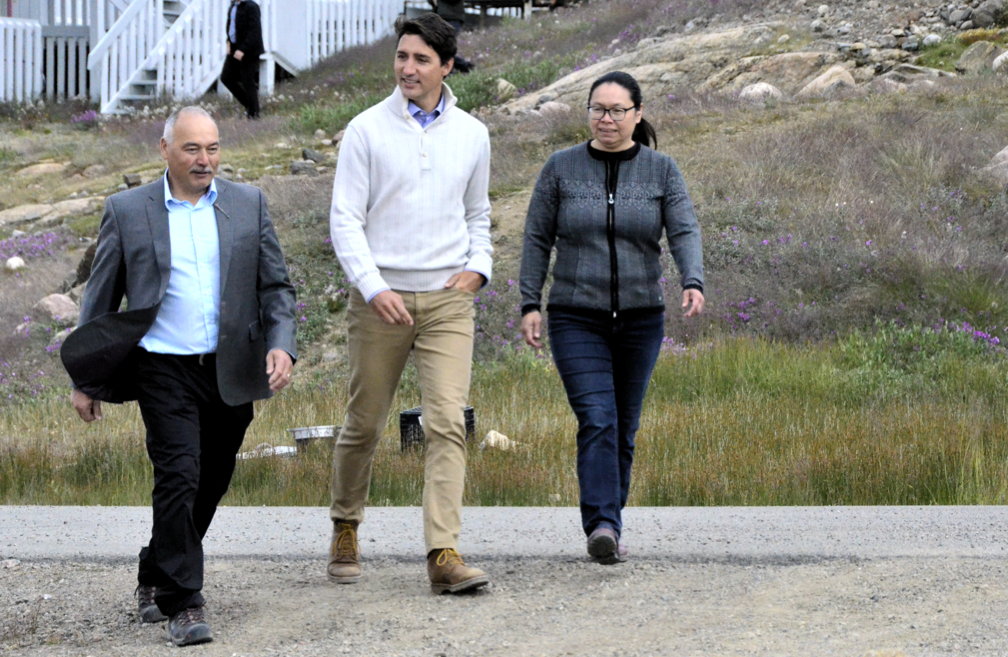Iqaluit’s mayor won’t run for re-election this fall
Madeleine Redfern says she will spend her time on business opportunities and other projects.

The mayor of Nunavut’s capital city will not run for re-election this fall.
Madeleine Redfern, Iqaluit’s mayor and former executive director of the Qikiqtani Truth Commission, made the announcement at a city council meeting on Tuesday, Aug 27.
Mayor Statement
City Council Meeting
August 27, 2019 pic.twitter.com/vFjDMHbgTV— MayorOfFish (@MayorMadeleine) August 27, 2019
She says she plans to focus on a number of business opportunities and projects after the city’s new mayor and council are elected later this year on Oct. 28.
“It’s really important that we see good members and capable members of our community to step up to be mayor and council,” Redfern told Nunatsiaq News.
“There’s a lot to learn. And there’s a lot of ways in which to help direct the growth and development of this city by being mayor and council.”
Redfern was first elected as Iqaluit’s mayor in a 2010 in a by-election but did not run for re-election in 2012. She says she made that decision in order to spend time with her grandchild, who was born that year.
But she ran once again and successfully took back the mayor’s seat in 2015, a time when the city was facing a deficit from the previous year when Iqaluit’s dump caught fire.
“I came back in 2015 because of the state of the city, and it’s been a challenge coming back with the city in worse shape than I’d left it,” Redfern said.
“It’s taken a tremendous amount of work to deal with the deficit resulting from the dump, and now to the stage where the city has $34 million for a new landfill.”
Redfern also leaves her role on council with a strategic five-year plan in place, a plan she hopes the next city council will stick to.
“The next mayor and council will be fortunate that there is this strategic plan. A lot of issues that need to be worked on have been identified. The development of multi-year budgets, especially for capital investments, really help ensure that the issues that are important to the community are implemented,” she said.
Before her term is up, Redfern says she would like to see at least the beginnings of a solution to the city’s ongoing water shortage, something she says she and the rest of the city have been working on for a long time.
“The main issue is for the city to present that solution. And the cost associated with that. It won’t be done likely between now and Oct. 28. But a lot of foundational work has been put in place to assist the next mayor and council.”
As mayor, Redfern has navigated relationships with her territorial and federal counterparts, something she says was not always easy.
“It’s taken tremendous effort, learning how to lobby Ottawa. Learning how to work with our territorial government to lobby Ottawa…. As a result, I know Ottawa inside and out. Politics is a team sport. It’s important that every elected official understands their role.” she said.
“This is a vibrant, capital Arctic city. And we need those investments in order to grow and develop and support growth and development.”
Beyond her relationships with multiple levels of government, she says she has also tried to strengthen the ties between Iqaluit and Nunavut’s other communities.
“A strong capital city is good for the territory. A lot of decisions get made here that affect the other communities…. We are the hub,” she said.
Although it is difficult to step away, Redfern said she feels confident leaving the city in a stable financial position.
“We’re now at a stage where there’s $44 million worth of municipal and capital projects even in this year alone. There’s a thousand new housing units coming online in the next three to five years. And that is based on approved building permits.”
“The next mayor and council need to ensure that it manages that growth responsibly,” she said.
As for the upcoming municipal election, Redfern said she hopes to see more Inuit candidates running for mayor and council.
“We need to see more Inuit run for these positions. Self-government requires us to do so. We have a class of very capable Inuit in this community. We need the best and our brightest to be part of running the capital city,” she said.
“I remain convinced, if Inuit lose the capital, we will lose control of the territory and the vision and objectives of the Nunavut Land Claims Agreement will be lost. Self-government doesn’t come from a report commissioned by some southern white consultants. It starts with us, right here, right now,” she told city council on Aug. 27.
And as the only woman on city council, especially as the only member with no vote, she hopes more women will run too.
“It’s been tough being the only woman and that women have therefore not had a vote on council for the last three years. More women need to be part of governing our capital city.”